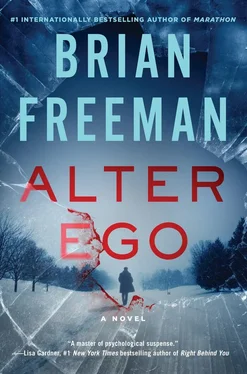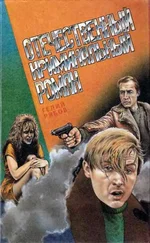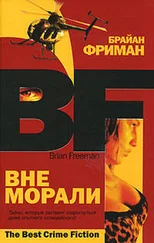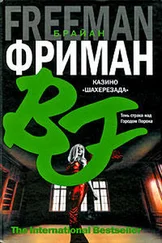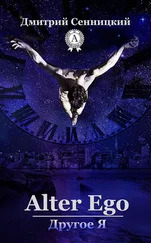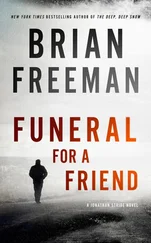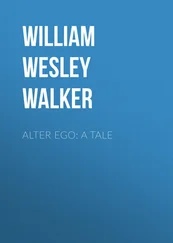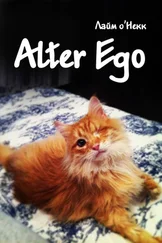Hey there.
Serena smiled in relief. A black-and-white chickadee had perched atop the curtain rod by the bedroom window.
“Well, hi,” she said to the bird. “Did you come in through the back door?”
Hey there, hey there , the bird replied.
“And I bet you want to get out again, don’t you?” Serena asked. She went to the casement window, which had no screen, and cranked the metal handle to open the window toward the winter air. As if the bird could smell freedom, it vanished quickly through the opening with a flutter of wings. Serena shut the window and locked it. It was one of the few locks in the house that seemed to work.
She laughed at her own anxiety. The dark house. The open door. The whistle of the bird. In the end, it had all proved to be nothing. Yet her unease refused to let go, and she wasn’t sure why.
Then she remembered.
It was something Lori Fulkerson had said.
There was a bird inside the box. Did they tell you that? A chickadee. You can’t see it, but it flies around, and it sings to you. It’s like this one beautiful thing that keeps you alive and reminds you of the outside world.
Aimee’s drugged delusion was that someone was going to kidnap her and put her in the box just like Art Leipold’s other victims. And now here was a chickadee trapped inside her house.
Serena knew it was a coincidence. Tiny little chickadees were one of the few songbirds tough enough for Minnesota winters, and they were common even in January. The lock on the back door didn’t work. The wind pushed it open. The bird flew inside. That was all it was.
Unless someone was playing a very strange game.
Stride found the small self-storage complex on a dirt road north of the city. It had been built on cheap land surrounded by acres of forest. There were three long, low buildings with rows of red garage doors. Piles of dirty snow had been plowed up to the edge of the trees, but the gravel driveways were slick with ice. He saw a gray Mercedes parked halfway down the third building, and he drove up next to it in his Expedition. He opened his window.
Chris Leipold was inside the Mercedes. He could see in Chris’s face that the stress and long hours of the movie production were taking their toll. Behind the man’s small wire-rimmed glasses, his eyes were watery. His skin was pale, and his thinning blond hair was greasy and unwashed. Chris opened the Mercedes window, and when the cold air hit his lungs, he unleashed a rattling cough.
“You okay there, Chris?” Stride asked.
“Flu. A little welcome home present from Minnesota.”
“Yeah, it’s going around. You should get some rest.”
“I’ll rest when we’re done filming,” Chris said.
“Is that going to be soon?”
Chris shrugged. “Depends on Aimee Bowe. We weren’t counting on losing her today, so we have to rearrange the shooting schedules. Hopefully, she’ll be back on the set tomorrow.”
“I wouldn’t count on that. She almost died.”
“Death’s a pretty good excuse, but short of that, actors have contracts.”
“Does Aimee have any scenes left with Dean Casperson?” Stride asked.
“One,” Chris replied. “Why?”
“I just thought it might be difficult for her.”
Chris shook his head. “I don’t know what you mean.”
“Come on, Chris. It’s just the two of us out here. Off the record. No notes, no reports. You can’t tell me it’s not all over the set that Aimee was drugged.”
“I talked to Dean. He says Aimee was clearly high on something when she arrived at his place last night. He asked me to try to keep it under wraps as best as I can. The last thing Aimee needs is to have people start saying she’s unstable. If that gets around, no one will hire her again.”
“So Casperson already has his knives out,” Stride said. “Discrediting her. Making sure she doesn’t talk.”
“He’s protecting her,” Chris replied.
Stride sighed in frustration. Everyone around Dean Casperson did his dirty work for him. Chris Leipold was essentially a good man, but in Hollywood, even good men made compromises. Everything was a trade-off. Sometimes talent came with perversions and secrets, and you had to live with it. If you wanted to get a film made, you couldn’t risk being blackballed, so you kept your mouth shut.
“Why did you want me out here?” Stride asked Chris, gesturing at the self-storage units.
“I got a call from the owner this morning. He came over here and saw one of the units with an open door. Somebody broke in overnight. It was my unit, so he wanted me to know about it.”
“You still keep a storage unit here in Duluth?” Stride asked.
Chris coughed phlegm into a tissue. The effort wore him out, and he laid his head back against the seat. “I keep all of Art’s crap here. That’s his whole life, crammed inside that little box. Appropriate, huh?”
Stride said nothing.
“I should have burned it long ago,” Chris went on. “Instead, I put all of it in here after the trial, and I’ve never wanted to deal with it since then. I just pay the bill month after month.”
“And now someone broke in?”
“Looks that way.”
“Is anything missing?” Stride asked.
“I haven’t gone inside. I probably didn’t need to call you, but if it involved Art, I figured you’d want to see it first. Old habits die hard.”
“Who knows you rent this unit?”
“Other than the guy who owns the complex? Nobody. That’s what makes it a little weird. The thing is, I came out here last week and spent some time going through everything. It was the same day I visited the hunting land. I don’t know, I guess I needed to face Art again.”
“Do you think someone followed you?” Stride asked.
“I can’t think of anything else.”
“Well, let’s take a look,” Stride said.
They both got out of their vehicles. Chris was slightly hunched from the flu and looked even smaller than he was. Stride checked the door to the storage unit and saw a padlock sitting in the snow, its shackle cut open. He bent down and slid up the garage door. Inside, the unit was crammed with furniture and boxes stacked on gray steel shelves. There wasn’t much room to walk. He saw paintings and framed photographs leaning against the walls on either side, and he recognized some of them from inside Art’s house.
Several of the boxes had been pulled off the shelves. They lay on the concrete floor, their lids open. A square nineteen-inch Panasonic television sat next to the boxes, its cord plugged into a power outlet on the wall. There was an old VHS player connected to the television, and its green light was on. He pushed the eject button, but the machine was empty.
“Did you leave it this way?” Stride asked.
“No, the boxes were on the shelves, and the TV wasn’t plugged in.”
“Somebody was watching something,” Stride said.
Stride squatted and pawed through the boxes on the floor. It was like an encyclopedia of Art’s career. He saw newspaper clippings of Art getting journalism awards and Art emceeing outdoor city events. There were plaques from charities and reading lists from the classes he’d taught. Stride also saw dozens of videotapes. They were archives of stories Art had done over the years. Each was neatly labeled, and Stride recognized Art’s handwriting. He took them out of the box one after another, and he remembered each of the stories from years earlier. It was like a history of his own life.
Murder-Suicide at Antenna Farm
Kerry McGrath Lakeside Disappearance
Mort Greeley / Child Abduction at the Zoo
Wallace Corruption Investigation
“Is anything missing?” Stride asked in a flat voice.
Chris sat silently on the cold concrete six feet away. He had another box between his legs, and he’d removed some of the contents. Stride could see gruesome memorabilia from Art’s other job as a serial killer. Newspapers with headlines about the trial. An old pair of boots that Stride knew had been found with traces of DNA from one of the victims in the box. Even a long ribbon of fabric that had been torn from a prison bedsheet. Stride was surprised Chris had kept it. It was the cell-made rope Art had used to hang himself.
Читать дальше
